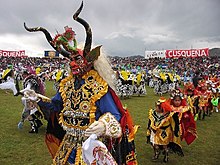Content deleted Content added
m robot Adding: es:Diablada |
MarshalN20 (talk | contribs) No edit summary |
||
| Line 4: | Line 4: | ||
This mainly Andean theatrical reportoire that began during the Spanish colonization of South America in order to teach the local natives the precepts of Christian faith and history of the Spanish Empire. The diablada causes a reform in the thinking of the indigenous altiplano cultures as missionaries from Spain, instilled the paradigm of good and evil, which is how the costumes of angels and demons became associated with the dance. |
This mainly Andean theatrical reportoire that began during the Spanish colonization of South America in order to teach the local natives the precepts of Christian faith and history of the Spanish Empire. The diablada causes a reform in the thinking of the indigenous altiplano cultures as missionaries from Spain, instilled the paradigm of good and evil, which is how the costumes of angels and demons became associated with the dance. |
||
==See Also== |
|||
*[[Diablada puneña]] |
|||
*[[Fiesta de la Candelaria (Puno)|Fiesta de la Candelaria]] |
|||
*[[Carnaval de Oruro]] |
|||
{{dance-stub}} |
{{dance-stub}} |
||
Revision as of 22:42, 2 August 2009


The Diablada is a dance, with auto sacramental origins in Spain that is practised in various regions of the Andes specially the Altiplano (Bolivia, southern Perú, Venezuela and nortern Chile).
This mainly Andean theatrical reportoire that began during the Spanish colonization of South America in order to teach the local natives the precepts of Christian faith and history of the Spanish Empire. The diablada causes a reform in the thinking of the indigenous altiplano cultures as missionaries from Spain, instilled the paradigm of good and evil, which is how the costumes of angels and demons became associated with the dance.